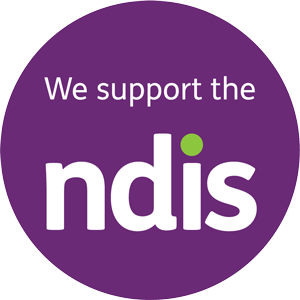Staying active is a personal journey — one that should complement your life’s rhythm. It’s about recognising where you’re at and moving forward from there. Listen to your body and take it step by step, at a pace that feels right for you.
With NDIS Exercise Physiology, every step and stretch is an act of self-care. It shows your strength and how much you care about your well-being. And because movement is a gift you give yourself, let’s find an exercise program that fits you perfectly. Your body, your rules. This journey towards being active is yours.



NDIS-Registered Provider
Holistic Care Approach
100% Melbourne-Based
Flexible, Practical Programs

You’re ready to move, but the fear of injury throws a shadow over your excitement. That’s okay. It’s natural to worry about getting hurt, especially when we’re starting something new. After all, one wrong move can set your progress back.
Moving past fear is not about avoiding the things that scare you. It’s about finding the courage to approach with the right NDIS support.
With guidance from professionals who understand your needs, you can exercise with confidence. The right program makes sure that each exercise is suitable for you. It reduces your risk of injury and makes your health and safety a priority. Let’s move forward together, without the worry holding you back.

Exercise can sometimes feel like a solo journey, especially when you’re dealing with challenges. You might worry about slowing others down. But what if there is a community who understands your journey
You don’t have to go through it alone. Find a group of friends who share your aspirations and understand your struggles. Together, discover that movement is not just about reaching personal milestones but about enjoying moments with others who are on similar paths. It’s about laughing together, supporting each other, celebrating every victory, no matter how small — and that community is waiting for you.
Read all about our participants’ NDIS experience with elvesCARE

Everyone moves differently. You have your own way of staying healthy and happy. With the NDIS Exercise physiology program, there’s something for everyone. Whether you need easy exercises or something a bit more active, this program has you covered.

When movement becomes a challenge, it can feel like your independence is slipping through your fingers. Simple tasks suddenly take more effort and time, and that can be frustrating. But what if you can regain some control?
A customised exercise program, designed just for you, helps you gain your independence back. By focusing on rebuilding strength and flexibility, you move freely and independently. Every step forward is a victory — and we’ll be there cheering you on along the way.
With the NDIS exercise physiology program, every improvement, no matter the size, is a cause for celebration. See results that drive you to push harder and further, everyday — as you get the support that you deserve.
Tell us what you need and one of our elves will help you get the support you need.
Exercise physiology is a specialised field within exercise and sports science that focuses on understanding how your body responds to movement.
Unlike regular fitness coaching, which often targets general fitness goals, exercise physiologists are allied health professionals with a bachelor’s degree or higher, specifically trained to design safe and effective exercise programs for people with various health conditions. Whether it’s a chronic illness, heart problems, or even nerve issues, they can design safe and effective exercise programs just for you.
They use exercise as a form of rehabilitation and prevention, tailoring programs to meet individual needs and improve overall well-being. Accredited exercise physiologists (AEPs) also undergo rigorous education and training, and they must adhere to the high standards set by Exercise and Sports Science Australia (ESSA) to maintain their accreditation.
Living with a chronic condition can be challenging, but you don’t have to face it alone. An accredited exercise physiologist can be a valuable addition to your healthcare team.
These specialists have in-depth knowledge of how chronic conditions affect the body and daily function. They can create a personalised exercise program specifically tailored to manage your symptoms, improve your physical capabilities, and ultimately, enhance your quality of life.
These programs often focus on targeted exercises to build strength, improve cardiovascular health, and enhance endurance. Importantly, they prioritise your safety while considering the unique challenges presented by your condition.
The goal isn’t just symptom management in the short term. An accredited exercise physiologist aims to empower you with the knowledge and skills you need to integrate physical activity into your daily routine for long-term success.
Your first visit to an accredited exercise physiologist will typically begin with a comprehensive assessment. This includes discussing your medical history, any existing health conditions, and your fitness goals.
Before creating your personalised exercise plan, the exercise physiologist may do some quick tests to understand your overall health. This information helps them to develop customised exercise programs that fit with your current health status and goals.
This first meeting is all about YOU! The exercise physiologist will listen to your preferences, concerns, and lifestyle. This helps them create a workout plan that’s safe, effective, and most importantly, something you’ll actually enjoy doing.
Yes, exercise physiology can help for both acute injuries and chronic conditions. For acute injuries, they’ll create a plan to help you regain strength, reduce pain, and get back to feeling your best faster, all while minimising the risk of getting hurt again.F
For chronic conditions, they can design exercises to manage symptoms, improve your overall health, and even help prevent your condition from getting worse.
In both cases, the exercise program will be custom-made for you, considering your injury or condition, overall health, and fitness goals.
Exercise physiology programs are often integrated into broader treatment plans in collaboration with other healthcare professionals. As part of an allied health team, exercise physiologists work closely with general practitioners, physiotherapists, dietitians, and other specialists to provide a holistic approach to health and well-being.
This collaborative effort makes sure your exercise program fits perfectly with your overall health plan. No matter if you’re managing a long-term condition, recovering from an injury, or just trying to get in better shape, this teamwork helps get the most out of all your treatments.
Absolutely. Your accredited exercise physiologist can create a workout plan just for you, using things you already have at home. Think bodyweight exercises, stretches, and activities like walking or biking. They can even show you how to use everyday items like water bottles as weights. The most important thing is to stick with the program and you’ll start seeing results in no time!
Physical activity has a big impact on mental health. Moving your body regularly can actually help reduce anxiety, depression, and stress. It does this by releasing endorphins, which are like your body’s natural happy chemicals. These chemicals can improve your overall mood and make you feel less sad or worried.
Exercise can also do amazing things for your self-esteem, sleep, and sense of accomplishment. Plus, an exercise physiologist can help you find activities you enjoy that not only make you stronger physically but also lift your spirits.
When looking for an exercise physiologist, make sure they are accredited by Exercise and Sports Science Australia (ESSA). This accreditation means they have completed a university degree in exercise physiology and that they stick to the highest standards of professional practice. It also means they continue learning to keep their knowledge and skills up to date.
Accredited exercise physiologists are trained to work with individuals with a range of health conditions, including chronic diseases, cardiovascular and respiratory issues, and neurological conditions, ensuring safe and effective exercise prescriptions.
If you have a respiratory condition, they can design a personalised program that includes exercises for your heart and lungs, strength training to help your breathing muscles, and special breathing techniques to make breathing easier. This can help you manage your symptoms, be more active throughout the day, and get things done easier.
As you change and get stronger and fitter, your exercise program should, too.
Your exercise physiologist will be your partner in progress. They’ll check in regularly to see how you’re doing and adjust your workout plan based on your improvements, any changes in your health, or if your goals shift. This keeps things interesting, challenging (in a good way), and most importantly, safe for you.
Remember, communication is a two-way street. Let your exercise physiologist know what’s working well and any new challenges you face. This helps them tailor the program to keep you motivated to reaching your health and fitness goals
About
Services
Useful Links
Useful Information